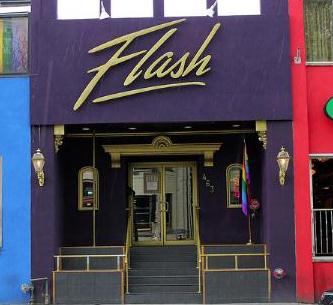
Strippers at Church Street's Flash club may be affected by council's new rules. Credit: Rob Salerno
City staff have proposed several changes to Toronto’s strip club regulations, including revisions that would ban private dances. The revisions are strongly opposed by industry groups who also say the proposal doesn’t take into account the different needs of strip clubs catering to the gay community.
The municipal licensing and standards committee will be voting on the new regulations on Oct 19, and if passed, they must be approved by the entire city council.
Under current regulations, entertainers are banned from making any physical contact with patrons, and all parts of a club must be openly visible from the stage – two regulations that are largely unenforced but can be used to harass club owners and entertainers. The Adult Entertainment Association also wanted the city to do away with licensing requirements for performers, who often find that the city’s permanent public record of stripper licences can stigmatize them for future employment.
The AEA had asked the city to revise and clarify those regulations, in particular so that casual contact between entertainers and patrons, like handshakes, wouldn’t break the law.
But the proposed revision more explicitly bans contact that could be sexual. The proposed text reads, “When providing services at an adult entertainment club, an entertainer is not permitted to touch, sit, or rest on, or make any physical contact with the covered, partially covered, or uncovered breasts, buttocks, genital, pubic, anal and perineal areas of a patron or any other person” and includes similar provisions that apply to patrons as well.
Although the report indicates that the purpose is to protect entertainers from unwanted contact, these regulations can also catch innocuous contact, such as when patrons may bump into or flirt with each other at a club – something more likely to take place at a gay club than at a straight club. It may also prohibit certain tactics male strippers use when trying to sell private dances to patrons.
“There’s a different socializing aspect that the gay strip clubs have,” says Tim Lambrinos, a spokesman for the AEA. “You’re much more conversationalists. There seems to be a lot of touching, casual, friendly contact between people and interaction. That’s something the staff haven’t grasped.”
The proposal also seeks to ban private booths at clubs by requiring that any private area not be enclosed on all sides – one side must either be open or have a partition that rises to a maximum of four feet.
Lambrinos says that the proposed regulation will kill the demand for private dances and make it harder for the entertainers to make a living.
“That’s what the entertainers have said. There’s a consumer demand that they want to be in a private area,” Lambrinos says.
“The strip clubs in Canada are the Canadian version of a brothel. It’s a little bit more polite: not as hardcore, sexy enough, but it doesn’t go all the way. This is backtracking to more of an American style, and it’s going to cause problems,” he says.
The Supreme Court ruled in 1999 that lap dances constitute indecent acts under the Criminal Code, but in 2005 the court also ruled that so-called swingers clubs or sex clubs are not indecent. In the coming months the Supreme Court will also be ruling on the legality of brothels.
Ironically, because swinger clubs are not regulated in the way that the city’s strip clubs are, the clubs could simply rebrand as swinger clubs and not fall under the city’s purview at all.
“They’re forcing us to become swinger clubs. We’ll collect a cover charge and have a sham membership and become a swinger club with no regulations,” Lambrinos says. “It’s in the city’s best interest to work with us.”
City staff also shot down the industry proposal to do away with mandatory licensing of dancers, citing concerns about human trafficking and prostitution. But the report indicates that the city should not release dancers’ personal records to the public.
The AEA will be asking the city to defer any decision on the proposed regulations for at least a month while performers and operators can be consulted.
This move is supported by Ward 27 Councillor Kristyn Wong-Tam, who does not sit on the MLS committee.
“If the workers haven’t been consulted about what they think, that conversation must take place,” she says.
The staff report indicates that all licensed performers were invited to participate in consultations leading to the report, but the report acknowledges that few entertainers returned the survey, which was mailed to them.
Lambrinos accuses city staff of making the consultations opaque and ignoring results that showed participants didn’t support several of the proposed changes. The staff report indicates that it segregated results from surveys that were all completed in the same handwriting, which Lambrinos says were filled in by AEA staff interviewing dancers who felt uncomfortable completing the surveys on their own.


 Why you can trust Xtra
Why you can trust Xtra


